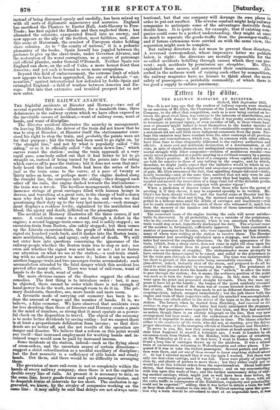T111.; R_A TLW.A.Y ANARCHY.
Tire frightful accidents at Bicester and Hornsey—two out of several reported this week—illustrate, for a hundreth time, three deficiencies in the railway system which we have often exposed as the inevitable causes of accident,—want of railway room, want of hands, and want of discipline.
The Bicester accident illestrates the anarchy in management On leaving Bletchley, the driver of the train did not know that he was to stop at Bicester; at Bicester itself the stationmaster exer- cised his right to stop the train, and probably the points were set for that purpose ; but the train had. been used to go right on, by `!the straight line," and not by what is popularly called "the siding," or as it is officially called "the main down-line," which curves round the station : seeing the train approach at a very rapid pace, somebody called out that it had better be let to go straight on, instead of being turned by the points into the siding which curves off to pass the station; but it does not seem thatan.y- body heard this last caution. Such had been the series of facts just as the train came to the curve, at a pace of twenty or thirty miles an hour, or perhaps more : the engine dashed along the straight line, the carriages into the siding—they dragged. each other off the rails, the engine dashed towards the stationhouse- the train was a wreck. The heedless management, whichintrusts immense strings of great carriages filled with human beings in droves, and travelling at a great rate, to the charge of half-a-dozen men who donl know what they are to do, and whom we find Tueationing their duty up to the very last moment, —such manage- ment displays a reekless levity, signalized by the mutilation and blood, the agony and death, inflicted on the passengers. The more. A not enter here into-train comes to a stand through a defect in the engine; a second more mutilation, blood, and agony, only short of death. We will excursion-train from Boston, also safely stopped; but then. comes up the Lincoln excursion-train, the people of which received no signal six hundred yards back, and it dashes into the Boston train:
-train.comes up, and is safely stopped ; an
tolLqrinsieelnillustierealling the ignorancerancea es'oiff the railway-people whether the Boston train was to stop or not; nor eveR ask whether the signal was sent back or not : lot us fasten our attention on what we see at the station,—a coal-train stand- ing with no sufficient power to move it ; before it can be moved another luggage-train and twopassenger-trains accumulated; such accumulation attended by the fatal danger which this accident has proved after many others. There was want of rail-room, want of hands to do the work, want of order.
The more obvious causes of the disaster suggest the efficient remedies. The first thing is to introduce order : bat, it may be objected, there cannot be order while there is not enough of hand-power to do the work, norm:m.0 room to do it in. The pri- mary desiderata, therefore, are, more hands and more room.
A favourite mode of carrying out economy has been to re- dime the amount of wages and the number of hands. It is, we believe, a false economy. We have observed that accidents even far less shocking than those of Bicester and Hornsey create a panic in the mind of numbers, so strong that it must operate as a power- ful check on the disposition to travel. The object of the economy is to make better dividends by saving outlay : but we suspect there mat least a proportionate defalcation from income; so that divi- dends are no better off, and the net results of the operation are danger and disaster. We believe that a reform on this point would pay itself—that increased employment for working hands and- in- creased wages would soon be paid by increased income.
Some incidents at the station, indeed—such as the flying about of cross-orders, and the uncertain source of certain directions— suggest a stria subordination as a needful auxiliary of discipline ; but the first necessity is a sufficiency of able hands and steady. heads. Get them, and there would he no difficulty in arranging them.
The provision of more rail-room is not so completely within the hands of every railway company, since there is not the capital to double every line of rails.. At present it is necessary to mix, on the same line, heavy goods-trains and quick passenger-trains, an& to deepatoh trains at intervals far too short. The confusion is ag- gravated, we know, by the rivalry of companies working on the same line : it may safely be said that. delays are not always unin-
tentional, but that one company will derange its own plans in order to put out another. The reverse conduct might help railway companies to anticipate some of the advantages derivable from double lines. It is quite clear, for example, that if existing eam. panics could come to a perfect understanding, they might at once do much to separate the goods-traffic from the passenger-traffic; and if future extensions were carried on with the same view, the separation might soon be complete. But railway directors do not mean to prevent these disasters. A reverend correspondent, whose impressive letter we publish below, is right: the directors are morally responsible for the so-called accidents befalling through causes which they can pre- vent : such accidents by permission are slaughter. Mr. Glya explained those causes, and announced their continuance. .A.b.. sorbed in the arduous work of ruining each other by competition, the railway magnates have no leisure to *ink about the mere safety of passengers—a perishable commodity, of which there is too good a supply to enforce parsimony.


























 Previous page
Previous page